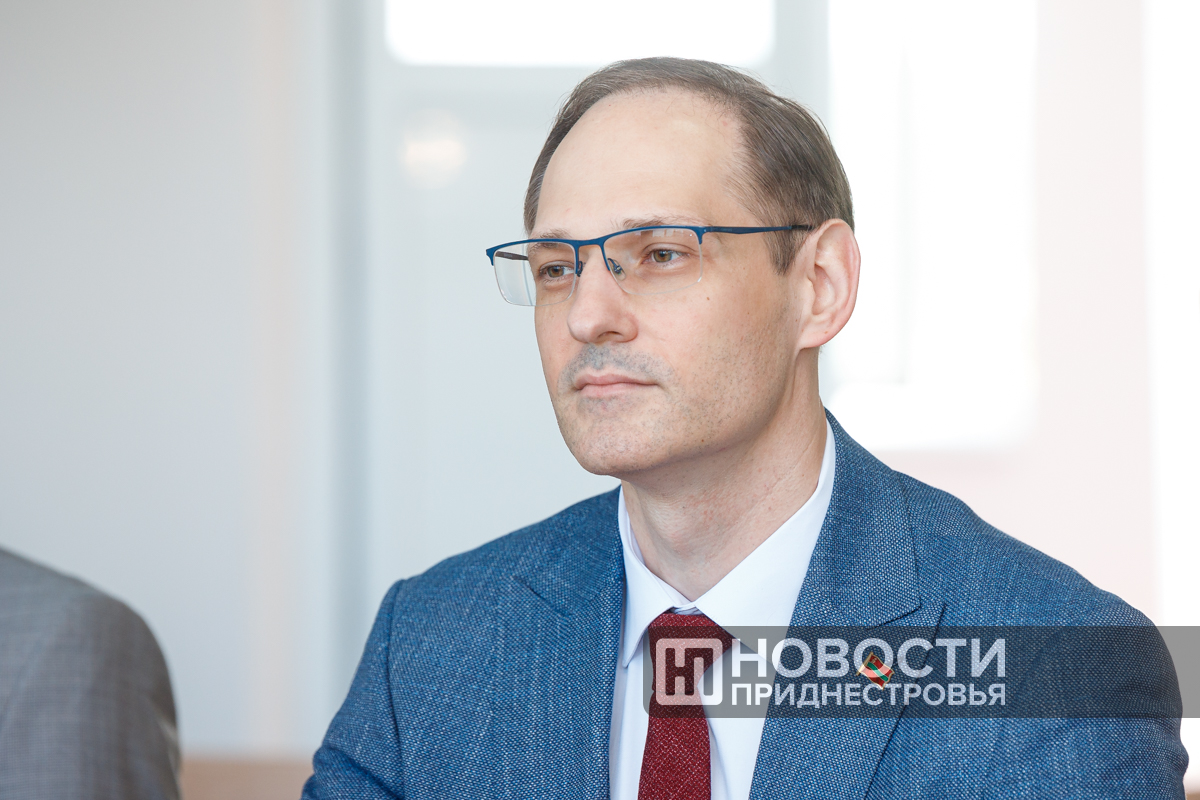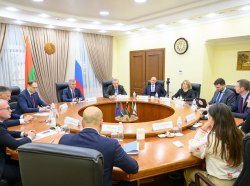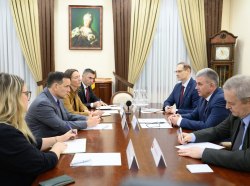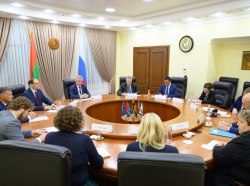Tiraspol, October 1. /Novosti Pridnestrovya/. Less than a month is left until the presidential elections and referendum on joining the European Union in Moldova. These electoral processes have a negative impact on the relations between Chisinau and Tiraspol, during such periods the risks of provocations increase, since some unscrupulous Moldovan politicians allow themselves to make speculative statements about Pridnestrovie, the Minister of Foreign Affairs of the PMR Vitaly Ignatiev said in an interview with RIA Novosti. He spoke about Chisinau's pressure on the Pridnestrovian industry and the Moldovan blockade of medicines for the unrecognized republic, as well as about Russia's role in settling the difficult relations between Chisinau and Tiraspol.
– Recently, the Russian Foreign Ministry stated that Moscow was ready to facilitate dialogue between the parties to the Pridnestrovian conflict both in the 5+2 format and on a bilateral track. However, today there is some stagnation in the dialogue between Chisinau and Tiraspol. Why do you think this is happening?
– This "stagnation", unfortunately, has been going on for many years and is becoming chronic. The answer to the question of why this is happening is obvious. After all, it is not Pridnestrovie that is blocking the dialogue mechanisms, not fulfilling its obligations, refusing to meet at the leadership level. On the contrary, for our part, we are maximally constructive and transparent, we are ready for communication, we put forward useful initiatives aimed at normalizing relations, for example, signing the Declaration of Commitment to Peaceful Methods of Settlement.
However, Moldova, hiding behind the pandemic, or the conflict and the electoral processes, is essentially avoiding interaction with Pridnestrovie, concentrating on non-dialogue forms of pressure. In this sense, we welcome the position of the Russian Foreign Ministry, since the parties need adequate and fair international mediation more than ever at this stage.
– Today, many people discuss the statement by Moldovan President Maya Sandu that she will be able to resolve the “Pridnestrovian problem” in a year or two. What does this position mean? Is it possible for a viable model for settling relations with Tiraspol to emerge in Chisinau now?
– To be viable, it must take into account the interests of both parties. This requires a compromise, which can only be developed through long, painstaking work at the negotiating table. However, Chisinau, which is exerting massive pressure on Pridnestrovie using hybrid methods, clearly has no intention of looking for mutually acceptable solutions. Therefore, you can judge for yourself the likelihood of a sustainable settlement model emerging in the Republic of Moldova now – it is close to zero.
Actually, it is rather biased to talk about resolving the Moldovan-Pridnestrovian conflict in the near future, when even the simplest everyday and economic issues can remain on the agenda for months and years. More than 30 years of experience in negotiations between the PMR and the RM convincingly proves that this is a very complex process that does not tolerate frivolous approaches. If we are talking about a crude forced scenario of settlement through pressure and threats, without taking into account the opinion of the Pridnestrovians, then this is an even more dangerous delusion, fraught with escalation with unpredictable consequences. I hope that such statements should still be regarded as pre-election rhetoric, taking into account the electoral processes in the RM, and not as practical calculations.
– Tiraspol reported that Moldova has increased pressure on Pridnestrovie ahead of the referendum on joining the European Union. Chisinau is blocking the export and import of a number of goods, which is significantly worsening the economic situation. How does this affect the work of enterprises and ordinary citizens?
– The measures of economic coercion implemented by Moldova against the industrial sector and foreign trade of Pridnestrovie have nothing in common with international and European norms, representing an elementary arbitrariness with the aim of solving political problems. Unfortunately, these malicious actions have specific destructive consequences. This week, the Pridnestrovian plant Moldavizolit stopped its work, which in the last two months the Moldovan authorities have not issued a single permit for the export of finished products. Before that, Elektromash stopped working for the same reason. As a result, more than a thousand people were left without work, unique work collectives were destroyed.
The Moldovan Metallurgical Plant, one of the industrial flagships of Pridnestrovie, is also under threat. The plans of the Moldovan Government to assign the status of a tax monopoly to its state-owned company Metalferos, which violates international legislation on freedom of trade and competition, could lead to catastrophic consequences for the work of the MMP, which currently employs 2.3 thousand people. The shutdown of this production will have an extremely negative effect on the metallurgical, transport and energy sectors of the entire region, including Moldova, but this does not stop Chisinau. In early September, a problem arose with the import of dietary supplements to the PMR. To date, their import to Pridnestrovie from third countries is completely prohibited by the customs authorities of Moldova. In the middle of the month, one of the Pridnestrovian pharmaceutical companies was even unable to import drugs produced in Bulgaria and having the appropriate certification in the European Union. We are already talking about a direct violation of the Republic of Moldova’s obligations within the framework of the agreed trade regime between Pridnestrovie and the European Union, as well as EU norms themselves, as a result of which consumers and commercial companies in the PMR, as well as their European counterparties, suffer.
The attempts of the Moldovan side to cover up the repressive actions against Pridnestrovie by allegedly adapting the legislation to the requirements of the European Union do not stand up to any criticism, discrediting, in fact, Chisinau, as well as Brussels. Such steps, clearly contradicting the Moldovan leadership`s statements about the peaceful mood for the settlement of the conflict, are already having a negative impact on the atmosphere of dialogue and on the standard of living of the population of the PMR.
- A number of media outlets and experts today predict an escalation in the Pridnestrovian direction due to the presidential elections and the referendum on accession to the EU in Moldova. Are the risks and threats of provocations increasing for Tiraspol in this electoral period?
- The position of Pridnestrovie is quite clear: we are not part of the electoral processes in the Republic of Moldova, we do not intend to come into contact with them in any way and, accordingly, we do not want to be the object of manipulation on this topic. At the same time, the risks, of course, increase in such periods, since some unscrupulous Moldovan politicians allow themselves to make speculative statements about the PMR or even organize provocative actions. I think everyone remembers the episode when one of the current leaders of the Republic of Moldova personally tried to prevent those residents of Pridnestrovie who, on their own initiative, decided to take part in the voting in the territory of the neighboring state. We count on the prudence of the Moldovan side, which will refrain from expanding its own electoral context to relations with Pridnestrovie.
– Pridnestrovie is changing treatment protocols due to Chisinau blocking the import of medicines. At the same time, the Pridnestrovian Ministry of Health reported that there is a problem with certain drugs in the treatment of cancer patients. Is work currently underway to lift the drug blockade?
– The situation with the provision of medical institutions and the retail pharmacy network of Pridnestrovie with traditional drugs is close to critical. The healthcare system of the PMR, surely, demonstrates a certain level of adaptability, since patients need treatment regardless of what blockade measures Moldova applies. However, there is a shortage of a number of vital drugs.
In addition, due to the forced reorientation of purchases to the EU and Moldovan markets, which, of course, does not produce any medicines, but simply makes money on their resale to Pridnestrovie with VAT, duties and markups included in the price, many of the drugs have become significantly more expensive, sometimes several times, and have become less accessible to the population. Numerous discussions of this problem at meetings of relevant specialists and through official correspondence have not yielded results yet due to the inadequate position of Moldova. However, the Pridnestrovian side is not going to remove this issue from the current agenda. We will continue the dialogue with both the Republic of Moldova and international partners.
– Recently, a proposal was voiced in Georgia that Tbilisi could apologize to the Ossetian people for the war in August 2008. As for Pridnestrovie, are they expecting an apology from Chisinau for the aggression of 1992?
– The armed attack on peaceful Pridnestrovie was a criminal act of the authorities of the Republic of Moldova, and every crime, as is known, requires an admission of guilt. Let me remind you that as a result of the Moldovan aggression, more than 800 Pridnestrovians were killed, over 1,400 people were injured, and enormous material damage was caused. The war left a deep wound in the memory of the Pridnestrovian people, and this fact, of course, has a significant impact on Moldovan-Pridnestrovian relations.
In the international environment, accepting responsibility for acts of violence often helps to improve relations and restore historical justice. An example is Germany's apology for the monstrous crimes of the Nazi regime. In our case, official recognition of Chisinau's guilt for unleashing the conflict would also be a step in the right direction. The Pridnestrovian people, given the victims and suffering they have suffered, have the right to expect such a gesture from Chisinau. Moreover, I consider it mandatory within the framework of any peace process for a final and comprehensive settlement between the PMR and the RM.
At the current stage, Moldova is obviously not ready for this. Instead of critically comprehending the events of the early 1990s, they are trying to build a deeply false and opportunistic state mythology, almost presenting Moldova itself as a victim of aggression. But I would like to believe that sooner or later the Moldovan political class will mature enough to admit the mistakes made by its predecessors and implement specific actions that would allow us to turn this tragic page in our history.
- The Russian Foreign Ministry said that "protecting the interests of the residents of Pridnestrovie is one of Russia's priorities." How do you see Russia's role on the Dniester in this difficult time of geopolitical confrontation? What do you think Moscow is doing and what else can it do to maintain peace and stability on the banks of the Dniester?
– The Russian Federation is an ally and strategic partner that provides comprehensive support to its citizens and compatriots in Pridnestrovie. Russian peacekeeping efforts on the Dniester play a key role, including work in the mission's management bodies. Political, diplomatic and informational support for the peacekeeping operation remains a common priority. Russia is also a guarantor in the settlement process and a responsible participant in the 5+2 format.
We hope that Russia will use its solid diplomatic capabilities and role in the OSCE executive structures to stimulate the resumption of meetings of the Permanent Conference... This dialogue tool in the next year of the 50th anniversary of the Helsinki Final Act of the OSCE under the Finnish Chairmanship could play a stabilizing role in relations between Pridnestrovie and Moldova.
It is equally important to continue joint work to realize the potential of bilateral cooperation. As is known, a solid legal basis has been developed in Russian-Pridnestrovian relations in the past periods - about 80 interdepartmental and intersectoral agreements. This is a good basis for further development of cooperation in a wide range of areas. In particular, the issues of Pridnestrovians` simplified entry into Russian citizenship, the use of maternity capital funds in the territory of the PMR, assistance to the agricultural and industrial sectors remain relevant. We are confident that Russia has sufficient opportunities for targeted support of residents and the economy of Pridnestrovie, as well as the intensification of the negotiation process and the use of international platforms to prevent violations of the rights of the PMR population by Moldova.








